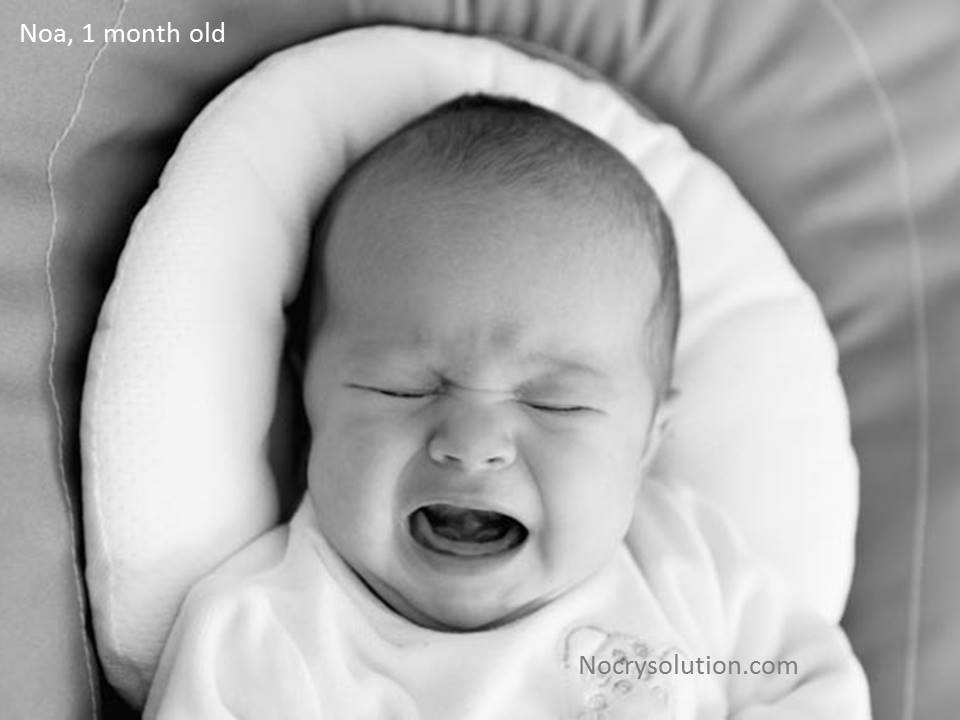By Elizabeth Pantley, author of The No-Cry Sleep Solution for Newborns
When we dream about our baby-to-be, we always envision those beautiful scenes, which show a charming baby smiling up at a peaceful mother’s face. We read books in advance of the big day about how to care for a newborn, how to bathe, feed and dress her, and then we feel somewhat prepared. However, a crying baby is never part of that idyllic vision, so this takes us by surprise. But the fact is, all babies cry at one time or another. Some babies cry more than others, but they all do cry. Understanding why babies cry can help you respond effectively to your crying baby, so can the list of ideas that follows.
Why does my baby cry?
Simply put, babies cry because they cannot talk. Babies are human beings, and they have needs and desires, just as we do, but they can’t express them. Even if they could talk, they wouldn’t understand themselves well enough to articulate their needs, so babies need someone to help them figure it out. Their cries are the only way they can say, “Help me! Something isn’t right here!”
Different kinds of cries
As you get to know your baby, you’ll become the expert in understanding his cries in a way that no one else can. Over time, you’ll recognize particular cries as if they were spoken words. In addition to these cry signals, you often can determine why your baby is crying by the situation surrounding the cry. Following are common reasons for Baby’s cry, and the clues that may tell you what’s up:
Hunger: If three or four hours have passed since his last feeding, if he has just woken up, or if he has just had a very full diaper and he begins to cry, he’s probably hungry. A feeding will most likely stop the crying.
Tiredness:
Look for these signs: decreased activity, losing interest in people and toys, rubbing eyes, looking glazed, and the most obvious ¾ yawning. If you notice any of these your baby just need to sleep. Rock her, sling her or put her in her swaying cradle.
Discomfort: If a baby is uncomfortable ¾ too wet, hot, cold, tummy ache ¾ he’ll typically squirm or arch his back when he cries, as if trying to get away from the source of his discomfort. Try to figure out the source of his distress and solve his problem.
Pain: A cry of pain is sudden and shrill, just like when an older child cries out when they get hurt. It may include long cries followed by a pause during which your baby appears to stop breathing. He then catches his breath and lets out another long cry. Time to check your baby’s temperature, and undress him for a full-body examination.
Overstimulation: If the room is noisy, people are trying to get your baby’s attention, rattles are rattling, music is playing, and your baby suddenly closes her eyes and cries and turns her head away, she may be trying to shut out all that’s going on around her and find some peace. It’s time for a quiet, dark room and some peaceful cuddles.
Illness: When your baby is sick, he may cry in a weak, moaning way. This is his way of saying, “I feel awful.” If your baby seems ill, look for any signs of sickness, take her temperature and call your healthcare provider.
Frustration:
Your baby is just learning how to control her hands, arms, and feet. She may be trying to get her fingers into her mouth or to reach a toy, but her body isn’t cooperating. She cries out of frustration, because she can’t accomplish what she wants to do. All she needs is a little help.
Loneliness: If your baby falls asleep feeding and you place her in the crib, but she wakes soon afterward with a cry, she may be saying that she misses the warmth of your embrace and doesn’t like to be alone. That’s a simple situation to resolve… pick up your baby.
Worry or fear: Your baby suddenly finds himself in the arms of Great Aunt Matilda and can’t see you; his previously happy gurgles turn suddenly to crying. He’s trying to tell you that he’s scared: He doesn’t know this new person, and he wants Mommy or Daddy. Explain to Auntie that he needs a little time to warm up to someone new, and try letting the two of them get to know each other while Baby stays in your arms.
Boredom:
Your baby has been sitting in his infant seat for 20 minutes while you talk and eat lunch with a friend. He’s not tired, hungry or uncomfortable, but he starts a whiny, fussy cry. He may be saying that he’s bored and needs something new to look at or touch. Taking him out of his seat to join the visit or providing a new toy to hold may help.
In our next post we’ll talk about how to help your baby when you’ve gone through the list but still have no idea what is causing the crying.
Elizabeth Pantley is a mother of four, grandmother, and author of the bestselling book, The No-Cry Sleep Solution for Newborns plus 8 other books in the No-Cry Solution Series, which helps Moms and Dads through all key stages of parenting.
